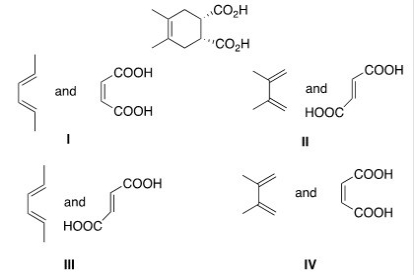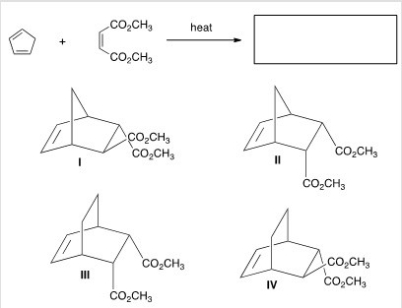Exam 14: Conjugation, resonance, and Dienes
Exam 1: Structure and Bonding77 Questions
Exam 2: Acids and Bases59 Questions
Exam 3: Introduction to Organic Molecules and Functional Groups56 Questions
Exam 4: Alkanes64 Questions
Exam 5: Stereochemistry76 Questions
Exam 6: Understanding Organic Reactions53 Questions
Exam 7: Alkyl Halides and Nucleophilic Substitution73 Questions
Exam 8: Alkyl Halides and Elimination Reactions52 Questions
Exam 9: Alcohols,ethers,and Related Compounds60 Questions
Exam 10: Alkenes and Addition Reactions54 Questions
Exam 11: Alkynes and Synthesis51 Questions
Exam 12: Oxidation and Reduction51 Questions
Exam 13: Radical Reactions51 Questions
Exam 14: Conjugation, resonance, and Dienes53 Questions
Exam 15: Benzene and Aromatic Compounds47 Questions
Exam 16: Reactions of Aromatic Compounds60 Questions
Exam 17: Introduction to Carbonyl Chemistry; Organometallic Reagents; Oxidation and Reduction59 Questions
Exam 18: Aldehydes and Ketones - Nucleophilic Addition52 Questions
Exam 19: Carboxylic Acids and the Acidity of the O-H Bond53 Questions
Exam 20: Carboxylic Acids and Their Derivatives - Nucleophilic Acyl Substitution50 Questions
Exam 21: Substitution Reactions of Carbonyl Compounds at the a Carbon47 Questions
Exam 22: Carbonyl Condensation Reactions51 Questions
Exam 23: Amines65 Questions
Exam 24: Carbon-Carbon Bond-Forming Reactions in Organic Synthesis47 Questions
Exam 25: Pericyclic Reactions62 Questions
Exam 26: Carbohydrates50 Questions
Exam 27: Amino Acids and Proteins46 Questions
Exam 28: Synthetic Polymers45 Questions
Exam 29: Lipids45 Questions
Exam 30: Molecular Ion Peaks and Fragmentation Patterns19 Questions
Exam 31: Analyzing Molecular Motion and Infrared Spectroscopy37 Questions
Exam 32: Organic Spectroscopy Concepts51 Questions
Select questions type
Which triene has the largest heat of hydrogenation? 
Free
(Multiple Choice)
4.9/5  (31)
(31)
Correct Answer:
D
Which triene absorbs the longest wavelength of UV light? 
Free
(Multiple Choice)
4.8/5  (26)
(26)
Correct Answer:
A
Which of the following is the least reactive diene in a Diels-Alder reaction? 
Free
(Multiple Choice)
4.8/5  (35)
(35)
Correct Answer:
D
What diene and dienophile are used in a Diels-Alder reaction to prepare the following compound? 
(Multiple Choice)
4.9/5  (42)
(42)
Rank the following compounds in order of increasing stability,putting the least stable first. 
(Multiple Choice)
4.9/5  (36)
(36)
Which of the following is a major resonance contributor to the first structure? 
(Multiple Choice)
4.8/5  (43)
(43)
Which of the following is an example of a bridged bicyclic system? 
(Multiple Choice)
4.8/5  (28)
(28)
Which of the following statements about the Diels-Alder reaction is true?
(Multiple Choice)
4.8/5  (34)
(34)
Which of the following is not a product obtained from the addition of 1 equivalent of HBr to (E)-1,3-pentadiene?
(Multiple Choice)
4.9/5  (43)
(43)
Which of the following is not a feature of the Diels-Alder reaction?
(Multiple Choice)
4.8/5  (35)
(35)
Which of the following is the appropriate term for the mechanism of the addition of HBr to 1,3-dienes?
(Multiple Choice)
4.8/5  (30)
(30)
Which of the following electronic transitions is common in the UV spectrum of 1,3-butadiene?
(Multiple Choice)
4.9/5  (38)
(38)
Which of the following is the most reactive diene in a Diels-Alder reaction? 
(Multiple Choice)
4.9/5  (38)
(38)
What is the major organic product of the following reaction? 
(Multiple Choice)
4.9/5  (28)
(28)
Rank the following dienophile in order of increasing reactivity in a Diels-Alder reaction,listing the least reactive first. 
(Multiple Choice)
4.8/5  (35)
(35)
What is the kinetic product obtained from the addition of 1 equivalent of HBr to 1,3-butadiene?
(Multiple Choice)
4.9/5  (31)
(31)
Showing 1 - 20 of 53
Filters
- Essay(0)
- Multiple Choice(0)
- Short Answer(0)
- True False(0)
- Matching(0)